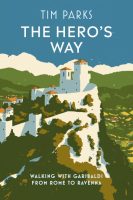The Hero’s Way
by Tim Parks
(Harvill Secker, £20)
 Le Rasse is a country-house restaurant to the east of Citerna, in Umbria. From its swimming pool, built on the edge of a ridge, you can look down on the village of Monterchi, thinking, perhaps, of Piero della Francesca’s Madonna del Parto, a portrait of the pregnant Virgin Mother, on show in the museum there. Many people would. But not Tim Parks, that renowned English interpreter of Italy. “Sitting with your feet in the water,” he writes in The Hero’s Way, “you could easily imagine aiming a gun at the arriving Austrians.”
Le Rasse is a country-house restaurant to the east of Citerna, in Umbria. From its swimming pool, built on the edge of a ridge, you can look down on the village of Monterchi, thinking, perhaps, of Piero della Francesca’s Madonna del Parto, a portrait of the pregnant Virgin Mother, on show in the museum there. Many people would. But not Tim Parks, that renowned English interpreter of Italy. “Sitting with your feet in the water,” he writes in The Hero’s Way, “you could easily imagine aiming a gun at the arriving Austrians.”
The Austrians of 1849, that is, who, with French forces, were pursuing the Italian revolutionary Giuseppe Garibaldi. A Roman Republic that had briefly replaced papal rule had fallen after a two-month siege. On the evening of July 2, riding alongside his pregnant Brazilian wife, Anita, Garibaldi led 4,000 volunteers out of the city to continue the struggle for independence in the countryside. Hounded by two armies, and avoiding the beaten track, the garibaldini marched hundreds of miles through Umbria and Tuscany and then over the Appenines, in an ill-fated attempt to cross the Adriatic to the independent republic of Venice.
In the summer of 2019, Parks, whose non-fiction includes Italian Neighbours and A Season with Verona, bought himself trekking shoes, persuaded his partner, Eleonora, to do the same, and they set off to retrace, day by day, the steps of the garibaldini. Why? Parks had long been fascinated by the Risorgimento, the process by which Garibaldi helped unify the various statelets of the Italian peninsula under one monarchy in 1861. He thought Garibaldi had been done an injustice by historians, who reduce him to “a tool in the hands of others”. And he believed it was “what the hero learned and the example he set on that calamitous… march that would make his future triumph possible”.
But he didn’t “fall in love” with Garibaldi, he says, until he read an account of the retreat from Rome by Gustav Hofstetter, a Bavarian officer in Garibaldi’s multinational band who served as his aide-de-camp. Hofstetter, through the pages of his diary, keeps Parks and Eleonora company as they tramp up collina and down valle. So do several other chroniclers of this epic story of flight and pursuit. It’s a walk of 400 miles, and a trip back in time through 170 years.
Parks and Eleonora aren’t in danger of being shot or run through with a sword, though they do have to contend with 40-degree heat, snapping, snarling dogs (which terrify Eleonora, who was mauled as a child), and a tourist trade intent on fleecing them. But like the garibaldini — who might be welcomed by patriots in one place and barred by priests from another — they don’t know where they’ll be eating and sleeping: they seek out cafés and b&bs en route. And just as the Austrians lost Garibaldi on one stretch because he took a road that wasn’t on their maps, so the 21st-century wayfinders can lose their bearings, their app leading them, once, up a literal garden path to a tool shed.
Wherever they are, they’re comparing notes with those who walked this way before them, and marvelling at the canniness and creativity of the man who led them, who could keep everyone (including his own officers) guessing over where he might turn, what he might do. Garibaldi, Parks argues, was the most important of the patriot leaders because he understood, “precisely after this long and disappointing retreat, that they must drop all talk of social revolution and republicanism. They must unite around the single aim of Italian unity. It was the only way to bring the bourgeoisie on board and sever their ties with the foreigner.”
He certainly emerges from these pages as a man worth following, but one to be feared, too, for he would have no hesitation in executing a garabaldino who caused friction with local people. Modesty went with his magnetism; he was “a hero without hauteur”. Then there’s Anita, who insists on marching on despite falling ill. This is a woman who, when captured during a battle in South America, escaped at night, fording a river while under fire by holding on to a horse’s tail.
Occasionally, the quoted chats between Parks and his own companion about their predecessors seem a little contrived, exposition rather than conversation. Sometimes, too, expense having precluded the provision of anything but an outline map, it can be hard to keep track of twists, turns and manoeuvres. The author suggests Google Maps as an aid, but I reckoned that would be a distraction; my answer, when directions got complicated, was to read swiftly on.
Early in the walk, Parks declares: “I could never have such a sublime goal in life as Garibaldi had — fighting for liberty, the making of a nation — but I do want to share something of his enviable purposefulness, his derring-do.” Job well and truly done.
